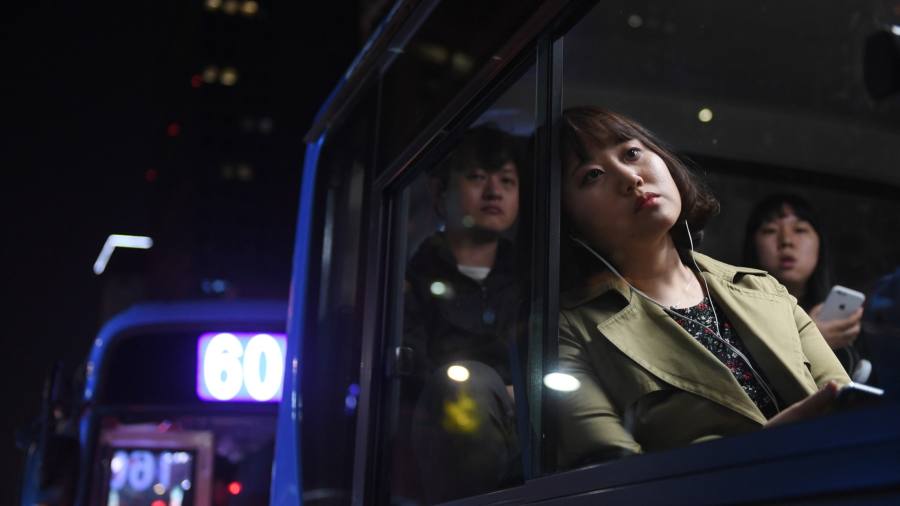Unions attack South Korea’s 69-hour work week plan

South Korea’s plans to boost the work week from 52 to a maximum 69 hours fills SM Chang, a 47-year-old worker at a credit card company, with dread.
Working overtime was the norm until the government introduced the 52-hour work week five years ago. “Nowadays, our office computers are turned off automatically shortly after six. I have to get permission from my boss six hours before working overtime,” said Chang, who did not want her full name to be published. “I really don’t want to go back to those old days without evenings.”
But longer work days may be on the cards after the conservative administration of President Yoon Suk Yeol, who took office last May, announced plans to increase the permitted weekly hours to almost twice France’s 35-hour week.
Proponents of the plan argue it can offer a solution to the problem posed by an ageing population and a declining workforce, but even in a country famed for its workaholic culture, it has prompted a backlash.
Under a system introduced in 2018, the South Korean work week involves 40 hours of regular work and 12 hours of overtime. Businesses that breach the rules can face a jail sentence or hefty fine.
The proposed change allows employers to count overtime on a monthly, quarterly and yearly basis. The government argues that it will enable workers to bank more overtime in busy periods, which they can later take back as leave.
The labour ministry said the current weekly limit restricted the rights of companies and workers to choose their working hours. In Korea’s ageing society, it argued that extended periods of leave would allow more family time, even boost the country’s falling fertility rate.
South Korea’s total fertility rate fell below the so-called replacement birth rate of 2.1 births per woman in 1984 and has been falling ever since, meaning that fewer and fewer fresh graduates are joining the workforce. The rate is now the lowest in the world at 0.78.
“We can resolve serious social problems like fast ageing and low birth rates by allowing women to choose their working hours more flexibly,” said labour minister Lee Jung-sik.
Business associations have welcomed the government plan for allowing “management and workers to boost efficiency by choosing working hours”. Manufacturers, builders and IT service providers have called for more flexibility in working hours, citing staff shortages and difficulties in meeting deadlines.
But labour unions have blasted the “toxic” plan, calling it an “anachronistic idea”. “The government is forcing workers into ultra-long hours of intensive work,” said the Federation of Korean Trade Unions.
The president faces opposition in parliament too, where the country’s main opposition party has vowed to block the reform, noting a high prevalence of work injuries and deaths due to over work. There were 739 claims for state compensation due to deaths from overwork in 2021, labour ministry data suggests. Nearly 40 per cent of these claims were approved.
The country’s workaholic culture contributed to its rapid industrialisation over the past half century and helped transform it into the world’s 10th largest economy.
South Koreans put in an average of 1,915 hours in 2021, the fifth-most globally after Mexico, Costa Rica, Colombia and Chile, according to the OECD. It was 199 hours more than the OECD average.
But many people struggle to make ends meet and rising property prices have put housing out of reach to many. At the same time, there is high social pressure to succeed.
“Long hours of work at low wages is still rampant in the country while pressure to stay ahead remains strong among white-collar workers,” said Choi Min, a labour rights advocate and medical doctor. “But a sharp increase in working hours and intensity in a short period poses serious health risks, often resulting in deaths from overwork.”
Bae Kyu-shik, a labour expert, suggests that the priority should be boosting productivity, rather than increasing hours. “The government plan can have very different effects from its expectations by going against young people’s wish for a work-life balance,” he said.
In practice, workers doubt they will be able to take extended leave. According to a government survey, workers at only 40 per cent of Korean companies were able to take their full annual leave in 2020.
SJ Cho, a 43-year-old employee at one of the country’s biggest conglomerates, recalls once working for 10 days during his holiday.
“Until the 52-hour work week limit was introduced, we couldn’t leave the office until our boss did because they would evaluate our work ethics by this,” he said. “It is a highly competitive environment. If I take a month of vacation, I bet they will just remove my desk.”
Despite the 52-hour limit, Baek, who did not want to give her full name, often works into the night at an ecommerce start up. “A small company like ours always lacks workers. I just endure, hoping things will get better once our company grows big. But if the government gives a wrong signal by lowering the hurdle, it just makes me give up such hope.”
Share this news on your Fb,Twitter and Whatsapp
Times News Express:Latest News Headlines
Times News Express||Health||New York||USA News||Technology||World News

